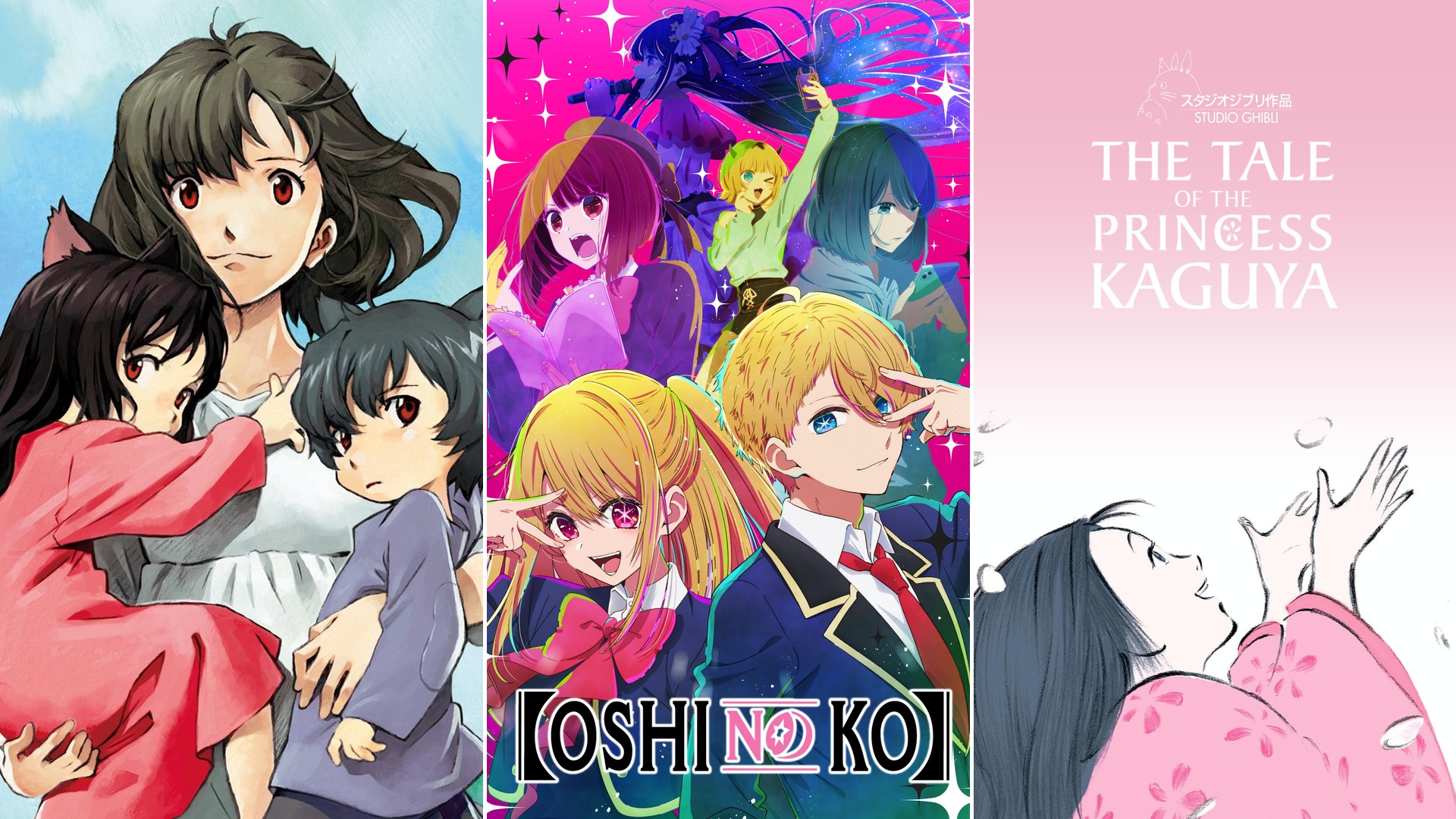The titles below lean into grief, loneliness and the cost of love. Each choice earned a spot for its enduring emotional impact, not only for a single twist but for how it sits with you after the credits. Some are quiet, some are brutal, all are human.
This list counts down from #33 to #1 and includes both films and series. Expect spoilers for tone and themes, but plot twists are kept light where possible. Use the image prompts if you want a quick refresher on each work.
#33. Your Name
Makoto Shinkai’s hit blends body swap romance with a disaster story. The pull comes from two teens trying to hold onto fading memories that refuse to stay.
The red thread motif and the comet strike frame a simple fear: forgetting someone who changed your life. The long train scene and the twilight meeting underline how time works against them.
What lingers is the ache of almost meeting, almost knowing and almost losing. That final stairway moment is hopeful yet still haunted by absence.
#32. Fruits Basket
The 2019 adaptation turns a shoujo premise into a study of generational trauma. Tohru’s kindness is not a magic fix, it is steady work that softens the Soma family’s pain.
Each backstory asks how people carry fear into love. Kyo, Yuki and Akito confront chains that feel invisible yet heavy. The curse is a metaphor for abuse and control.
Loss hangs over the series, from Tohru’s mother to broken childhoods. The final season pays off years of small steps toward healing.
It ends gently, not neatly. Joy arrives with scars still showing, which is what makes it credible.
#31. Cowboy Bebop
Bebop plays like a cool space western, but its core is loneliness. Each crewmate drifts in and out, never fully solving the past that shaped them.
Spike’s history with Julia and Vicious pulls him toward a fate he cannot outrun. Faye’s lost time, Jet’s regrets and Ed’s exit leave the ship quieter each arc.
The finale accepts consequence over comfort. Spike chooses closure that costs him everything, ending with a single finger gun.
“Whatever happens, happens.” The line lands like a resigned prayer. The show leaves you with silence that feels earned.
“Bang.”
#30. Oshi no Ko
Idol sparkle hides a story about exploitation and revenge. The first episode redefines the series in one sharp act of violence.
Twins Aqua and Ruby chase truth inside an industry built on lies. Fame becomes a mask that eats the person behind it, which is the show’s cruel thesis.
It is not misery for shock. It tracks how online hate, secrecy and power turn people into targets. The sadness sits in what the characters cannot say.
#29. March Comes in Like a Lion
Rei Kiriyama is a teen shogi pro who can barely breathe under isolation. The series gives his quiet a weight that feels true.
The Kawamoto sisters offer food and warmth without fixing him. Healing arrives as small habits, not breakthroughs and shogi becomes a mirror for self-worth.
The bullying arc shows pain that ripples through families. It is gentle, not soft and treats empathy as courage.
The sadness fades into a calm rhythm. By the time Rei smiles for real, you feel the distance he traveled, step by step.
#28. Kanon (2006)
Winter streets, forgotten promises and a town full of miracles that cost. Kyoto Animation’s remake ties five stories into one long thaw.
Ayu’s search, Shiori’s illness and Makoto’s arc build a steady ache. The show balances humor with a sense that time keeps taking without asking.
What endures is the idea that memory is both refuge and trap. The last bench scene with the tiny bell is quiet, cold and kind.
Its sentiment works because it never laughs at its sincerity. The snow carries the weight of unfinished wishes.
Rewatching feels like returning to a place you once knew, now smaller.
#27. Air
Summer sun and a curse that repeats across lifetimes. Misuzu’s frail joy makes every smile feel borrowed.
As the story loops back through history, tenderness meets inevitability. The “Gao” catchphrase hides a struggle that is hard to watch by design.
The ending is famous for a reason. It leaves you on a beach with hope that feels like prayer.
#26. Ef: A Tale of Memories
Shaft’s visual flair serves a blunt premise: love against amnesia. Chihiro’s 13-hour reset turns every promise into a race.
Renji’s patience becomes both noble and painful. The show asks if commitment can live when memory cannot hold it.
The parallel couple struggles with attachment and abandonment. Art direction underscores mood without hiding the wounds.
The result is sharp, stylish and sincere. It believes in effort even when effort is not enough.
#25. Colorful
A lost soul wakes in a boy who tried to take his life. The film peels back secrets with steady honesty.
It is a story about choosing to stay. Family failings, bullying and guilt are shown without melodrama or easy blame.
The last train platform and the title reveal reframe everything. Life is not fixed, but it is still worth facing.
Keiichi Hara directs with restraint. The film earns tears by letting characters be small and real.
Hope lands softly, which makes it credible.
#24. Made in Abyss
Wonder and horror share the same hole in the ground. Each layer asks what you will trade for knowledge.
Nanachi and Mitty’s story is the series in miniature. Curiosity meets cruelty and love tries to hold the pieces that science broke.
Bondrewd’s arc pushes the line further. The show keeps its childlike look while showing adult costs.
#23. Wolf Children
Hana raises two kids alone after a sudden loss. The film honors single parenthood with quiet detail.
Country life is not escape, it is work. Yuki and Ame step toward different futures and both choices hurt.
The ending holds on a mother who let go well. It is sad because it feels true.
Hosoda’s focus on seasons makes time visible. Every scene says love is daily labor.
The father’s brief warmth shadows the rest, never forgotten.
#22. The Tale of the Princess Kaguya
Isao Takahata turns a folk tale into a study of freedom. Kaguya’s joy in the countryside vanishes under court rules.
The brushstroke art makes emotion immediate. When she runs under the moon, the world seems to tear with grief.
The return to the moon is not triumph. It is a quiet surrender to a fate she never wanted.
Parental love becomes control by accident. The film never scolds, it simply shows the loss.
#21. When Marnie Was There
Anna’s summer by the marsh becomes a meeting with a girl who may be memory or ghost. The mystery masks a story about belonging.
The house, the silo, the diary, each clue points Anna back to herself. By the end she can name what she needs.
Bittersweet, not bleak. The parting scene is tender because it restores a family bond.
Ghibli keeps the pace slow and the air thick with salt and grass. The sadness is restorative.
It feels like saying thank you to someone you can no longer reach.
#20. Rascal Does Not Dream of a Dreaming Girl
The film brings Shoko’s story to the front and puts Sakuta and Mai through a no-win choice. Time loops and illness cross wires in a way that hurts.
What makes it sting is how ordinary moments get priced by fate. A date, a gift, a walk, any of them could be the last.
The resolution is cleaner than the road to it. The scars remain even when the timeline bends toward mercy.
#19. In This Corner of the World
Suzu marries into a new family near Hiroshima. The film shows wartime through meals, chores and small routines.
When violence finally hits, it is shattering. The loss of a limb and the quiet after the bomb carry real weight.
It ends with survival, not victory. Ordinary life continues with empty seats at the table.
The choice to focus on daily detail makes the grief more intimate.
#18. Tokyo Magnitude 8.0
A realistic quake tears a city apart and rebuilds a sibling bond. The series treats disaster with sobriety.
Mirai’s impatience and Yuki’s optimism feel like actual kids. Mari is the steady adult who keeps them moving forward.
The reveal is cruel but grounded. It shows how denial protects us until it breaks.
By the final walk home, every street sign feels heavy with absence.
The show is short, but it stays with you for a long time.
#17. Puella Magi Madoka Magica
A wish comes with a bill. The series tears down the magical girl shield and shows the costs.
Also Read
10 phrases that sound supportive but are actually a subtle sign of manipulation
Sayaka’s collapse, Kyoko’s choice, Homura’s loops, each arc digs deeper. Kyubey’s calm voice makes it all feel inevitable.
The ending is cosmic and sad. Salvation arrives, but it requires a girl to become a concept.
#16. 5 Centimeters per Second
Long-distance love that drifts into adulthood. Trains, letters and missed chances form a quiet tragedy.
Shinkai captures the gap between who we were and who we become. Snow and cherry blossoms mark time we cannot recover.
Also Read
10 Phrases That Sound Supportive But Are Actually a Subtle Sign of Manipulation
The final crossing says everything with a glance. Moving on still feels like loss.
Sound design carries the ache. Silence between messages is its own character.
#15. Plastic Memories
Giftia have a set lifespan, which turns every date into a countdown. Tsukasa and Isla choose love with eyes open.
The Terminal Service retrieves units at the edge of failure. It is a job built on goodbyes that never get easier.
Also Read
People With Low Emotional Intelligence Often Miss These 6 Social Cues
The final episodes are simple and direct. A bench, a promise and a last day done with grace.
The show asks if time limits reduce love or refine it. It argues for depth over length.
The answer hurts, which is why it matters more.
#14. Angel Beats!
A school for the dead where regrets go to rest. Humor masks a setup built for farewells.
Also Read
8 Weird Habits You Don’t Realize You Have From Growing Up In A “We Can’t Afford It” Household
Music is a release valve and a memory box. Each backstory lands with a different kind of ache.
The twist about Kanade ties the romance to a past act of kindness. Graduation is sweet and painful.
“Thank you.” The words turn a debt into a shared life.
#13. Banana Fish
A crime saga that never forgets its victims. Ash and Eiji find peace in small moments under constant threat.
Also Read
10 Phrases That Sound Supportive But Are Actually A Subtle Sign Of Manipulation
Abuse, power and the reach of a chemical weapon frame a love that cannot breathe in daylight. The story refuses easy rescue.
The last scene is quiet and devastating. A letter becomes the only way to say goodbye.
It is a show about survival that still ends with loss.
#12. Barefoot Gen
Few films show war with this much clarity. The Hiroshima sequence is blunt, graphic and unforgettable.
Also Read
8 Cringey Phrases Older Relatives Use at Family Dinners That Younger Guests Dread
Gen’s humor is a defense, not a cure. Hunger, grief and illness sit beside childlike resilience.
There is no comfort ending here. The gift is the refusal to look away from truth.
duty








